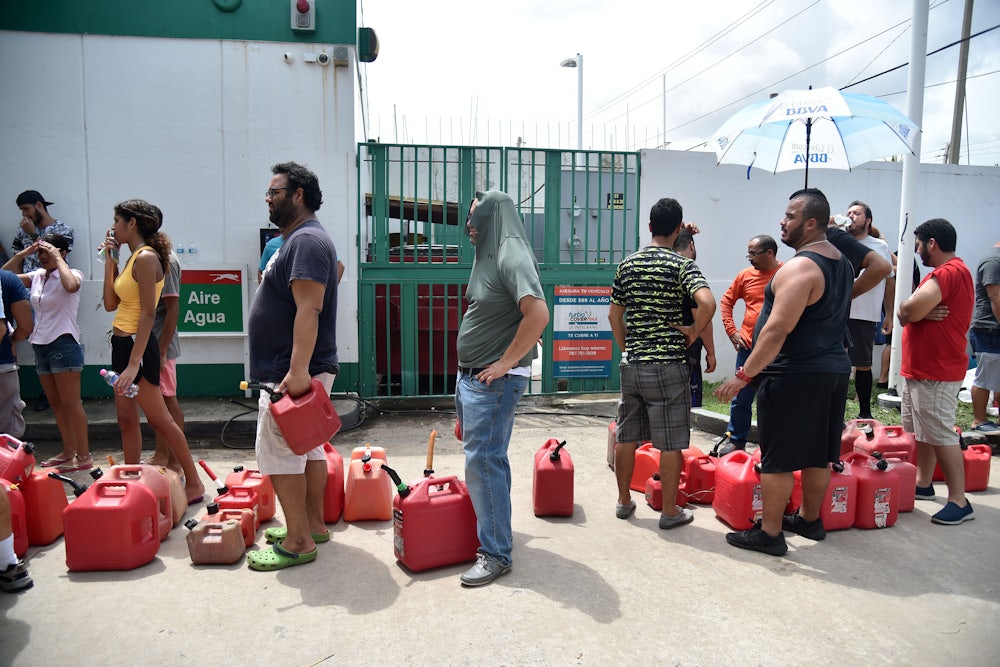A lot of people are upset over the Trump administration’s response to the humanitarian crisis in Puerto Rico, and for good reason. Trump waited nearly a week to address the devastation that Hurricane Maria caused in the U.S. territory, and when he finally did, he basically blamed the island’s government for its extensive problems. He has yet to ask Congress to pass a relief package. And as Vox notes, he “could deploy more military resources to help with search and rescue operations,” but isn’t.
But another controversial decision by Trump is less clear cut. On Monday, the Department of Homeland Security said it would not temporarily waive the Jones Act, also known as the Merchant Marine Act of 1920, which dictates that only American-owned, American-made, American-staffed ships can carry cargo between U.S. ports, including Puerto Rico. Waiving the law would allow international ships carrying food, water, and medical supplies to reach the island, and many people on the island desperately need all of those things.
It’s easy to see why people would be shocked. The U.S. mainland is far from Puerto Rico. “This is an island sitting in the middle of an ocean,” Trump said on Monday. “And it’s a big ocean, it’s a very big ocean.” So why not allow ships from closer places, like Jamaica, to dock and distribute aid? What’s more, Trump waived Jones Act requirements for hurricanes Harvey and Irma, allowing international ships to dock in order to make up for gas shortages. Why he won’t do the same for Puerto Rico, to save lives?
But here’s the thing: There are a ton of supplies in Puerto right now. People just can’t get to them. Only a few of the island’s 22 ports are usable, and at the biggest one in San Juan, there are thousands of huge shipping containers just sitting there, full of food, water, and medical supplies. Jose Ayala, Crowley’s vice president of Puerto Rico services, told the Wall Street Journal that current conditions make cargo transportation nearly impossible. “It’s pretty ugly out there,” he said. “There is damage to the trucking infrastructure, to the distributors, to the supermarkets, to the roads. And then, if your infrastructure is not so damaged, and you can get a driver to the truck, there is no fuel to move the equipment.” He added, “The cargo is here. The people of Puerto Rico should not have any fear that there is not going to be food or medicine on the island.”
To be completely clear: Trump should waive the Jones Act for Puerto Rico, and not just temporarily. The law has long been one of the reasons the economy there is failing, because it creates hurdles that drive up the cost of food and other goods in Puerto Rico. “Under the law, any foreign registry vessel that enters Puerto Rico must pay punitive tariffs, fees and taxes, which are passed on to the Puerto Rican consumer,” The New York Times recently explained. “The foreign vessel has one other option: It can reroute to Jacksonville, Fla., where all the goods will be transferred to an American vessel, then shipped to Puerto Rico where—again—all the rerouting costs are passed through to the consumer. Thanks to the law, the price of goods from the United States mainland is at least double that in neighboring islands... Moreover, the cost of living in Puerto Rico is 13 percent higher than in 325 urban areas elsewhere in the United States, even though per capita income in Puerto Rico is about $18,000, close to half that of Mississippi, the poorest of all 50 states.”
The Jones Act also impacts disaster recovery right now, in terms of cost; as the Huffington Post notes, Puerto Rico may have to pay twice as much for emergency supplies “at a time when it is economically and geographically devastated.” But such costs are not the most immediate concern in Puerto Rico at the moment. Instead, the challenge is getting food, clean water, shelter, and medical supplies to people who are suffering, no matter the cost. And right now, the Jones Act being in place does not appear to be contributing to our inability to do that.
